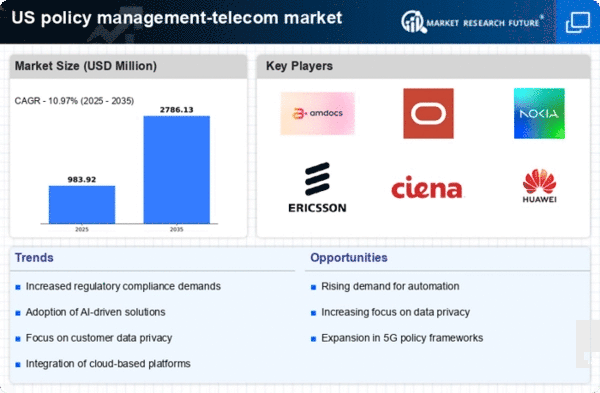Emergence of IoT and Connected Devices
The emergence of the Internet of Things (IoT) and connected devices is reshaping the policy management-telecom market. As more devices become interconnected, telecom operators face the challenge of managing a vast array of services and policies. This proliferation of IoT devices is expected to reach 30 billion globally by 2025, with a substantial portion of this growth occurring in the US. Consequently, telecom companies must implement comprehensive policy management solutions to effectively handle the complexities associated with IoT connectivity. These solutions are essential for ensuring seamless service delivery, optimizing network performance, and maintaining compliance with regulatory standards. The rise of IoT represents a critical driver for innovation and growth within the policy management-telecom market.
Shift Towards Subscription-Based Models
The policy management-telecom market is adapting to a notable shift towards subscription-based business models. As consumers increasingly prefer flexible payment options, telecom providers are re-evaluating their pricing strategies. This transition necessitates the implementation of dynamic policy management systems capable of handling various subscription tiers and billing cycles. In 2025, it is projected that subscription services will account for over 60% of telecom revenues in the US, underscoring the importance of effective policy management. By leveraging advanced policy management solutions, telecom companies can enhance customer satisfaction, streamline operations, and optimize revenue generation, making this shift a pivotal driver in the market.
Growing Demand for Data Privacy and Security
In an era where data breaches and privacy concerns are prevalent, the policy management-telecom market is witnessing a heightened demand for data privacy and security solutions. Telecom companies are under increasing pressure to protect customer data and comply with stringent regulations. The US Federal Communications Commission (FCC) has implemented various measures to enhance consumer protection, which has led to a growing need for effective policy management tools. In 2025, it is estimated that the market for data privacy solutions within the telecom sector will reach $10 billion, reflecting a significant increase in investment. This trend indicates that telecom operators must prioritize robust policy management frameworks to safeguard sensitive information and maintain customer trust.
Increased Competition and Market Consolidation
The policy management-telecom market is currently influenced by increased competition and ongoing market consolidation. As telecom operators strive to differentiate themselves, they are compelled to adopt innovative policy management solutions that enhance service offerings and customer experience. Mergers and acquisitions are prevalent, with several major players seeking to expand their market share. This competitive landscape necessitates the implementation of agile policy management systems that can adapt to changing business models and customer demands. In 2025, it is anticipated that the number of telecom mergers will rise by 15%, further intensifying the need for effective policy management strategies. Thus, The dynamics of competition and consolidation serve as significant drivers for growth in the policy management-telecom market.
Technological Advancements in Network Infrastructure
The policy management-telecom market is experiencing a surge in technological advancements, particularly in network infrastructure. Innovations such as 5G technology are reshaping the landscape, enabling faster data transmission and improved service delivery. As telecom operators invest heavily in upgrading their networks, the demand for robust policy management solutions increases. In 2025, the US telecom sector is projected to allocate approximately $30 billion towards network enhancements, which will likely drive the need for sophisticated policy management systems. These systems are essential for managing the complexities of new technologies, ensuring compliance, and optimizing service delivery. Consequently, The integration of advanced network infrastructure is a critical driver for growth in the policy management-telecom market.
















